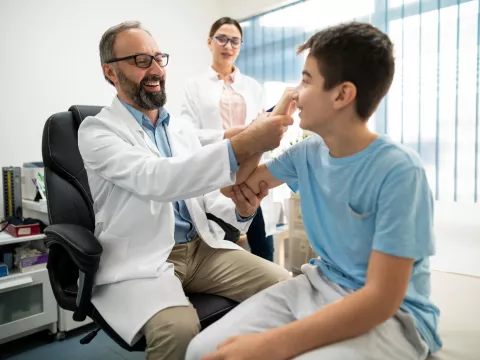- AdventHealth

Choose the health content that’s right for you, and get it delivered right in your inbox.
If your child wants to participate in school sports this year, they’ll need a sports physical.
A sports physical is a pre-participation evaluation (PPE). Sports physicals are in place to protect your child by letting you know whether it’s safe for them to play a sport.
Almost all youth organizations, camps and schools require a yearly sports physical. These exams are important for protecting your child’s physical health, but what exactly is a sports physical and what will it test? Keep reading to learn more about how sports physicals support your young athlete’s whole health in the long run.
What Is a Sports Physical?
A sports physical is a thorough exam that lets you know whether your child is healthy enough to participate in a sport. Most sports involve high levels of physical exertion, so it’s important that your child is assessed for potential complications so they can safely enjoy playing their sport.
Annual sports physicals are examinations performed by a health care provider. They’re nearly identical to school physicals, which evaluate your child’s physical and mental health at the start of each school year. The key difference is that sports physicals focus on your child’s physical mobility, any injuries and musculoskeletal development.
What Is a Sports Physical Meant to Do?
You can think of a sports physical as a type of health screening for student-athletes that serves several purposes.
First, they’re intended to ensure your child’s safety and well-being as they play sports. Your child’s whole health plays a big role in their participation and performance as a student-athlete.
These exams also help your health care provider identify any existing health conditions. Your physician will assess your child’s body to rule out signs of risk, injury and long-term complications that could impact their ability to play a sport.
Some sports require more physical exertion than others. Your child’s health care provider can assess your child’s fitness level for specific sports. Depending on their findings, your child may be cleared for only a few sports, or any they wish to play.
Elements of a Sports Physical
You may be wondering — what is a sports physical meant to test? Knowing what to expect when you go in for a sports physical helps you prepare your child and think of questions to ask your provider while you’re there.
There are three main components to a sports physical:
- Medical history review
- Physical examination
- Sports clearance
Medical History Review
Your provider will look at your child’s entire health history, looking for any serious or chronic conditions that impact their physical health. They may also access information about your child’s past injuries, family history, musculoskeletal problems and general health.
Additionally, they’ll discuss nutrition, weight, medications, menstruation and mental health concerns.
Physical Examination
During the physical exam, your health care provider will assess your child’s cardiovascular and musculoskeletal functions, which may involve evaluating any prior places of injury. Your child’s heart health, muscle tone, bone function and flexibility will help determine whether they’re fit for the sport(s) they want to play.
The tests may include and are not limited to:
- Physical examination
- General health screening
- Cardiovascular screening
- Orthopedic screening
- Neurologic screening
- Heat and hydration-related risk factors
- Medical history screening
- Mental health assessment
- Nutritional assessment
Clearance for Participation
If your child is cleared for participation in sports, they’re generally cleared to play any sport they want, unless specifically noted otherwise. Certain restrictions may apply based on your child’s unique health history and medical needs. Your health care provider will review your child's sports physical results with you for more clarity.
When and Why Are Sports Physicals Required?
Sports physicals are usually a pre-season requirement for student-athletes of all ages. This means you must get a doctor's clearance before the season's first sports practice.
Safety considerations are at play for any organization that supervises children, including public and private schools. That's why sports physicals are required — to help these organizations ensure the safety of their players.
Most schools have specific sports policies covering all students, even if they played sports the previous year. In some states, sports physicals are required by law.
What to Expect During a Sports Physical
You should make an appointment for your child's sports physical. Ensure it's done well before the beginning of the sports season. Once cleared, your child can fully participate in all practices and games.
You may need to bring documents that detail your child's medical and family history. Prepare these medical records before you go into the office. This step is especially important if you use an urgent care center for a sports physical, as they may not have your child's records on file.
Before your child's appointment, monitor their current health. Screen for any signs of contagious illness, like fever, diarrhea and vomiting. Many health care centers will ask about their health status before admitting you into the office.
The Benefits of Sports Physicals
Sports physicals can prevent devastating injuries and medical events. If your child isn't healthy enough to participate, a physical exam can catch the problem before an accident happens.
The exams can also enhance your young athlete’s confidence and performance levels. When they know they're fully cleared, your child can shine on the field or court as the athletic star they are.
Keeping up with your child’s sports physicals sets a good example of personal health awareness, as you're modeling the importance of monitoring their health and practicing positive lifestyle habits, like healthy eating and exercise.
Tips for a Successful Sports Physical
If your child’s health care provider doesn’t already have their health records on file, make sure to bring them, along with any important questions you have for your physician. There may also be additional health forms for you, as the parent, to fill out on behalf of your child once you arrive at their appointment. You’ll have a better appointment if you maintain open, honest communication with your provider.
In addition, encourage your child to be forthcoming about their daily habits to ensure their provider has a clear understanding of their full health. And if the examining provider has any follow-up recommendations, take them seriously. Investing in your child’s health and well-being now can help prevent serious consequences later.
Get Your Child’s Sports Physical at AdventHealth Centra Care
At AdventHealth Centra Care, we perform annual sports physicals, school physicals and other non-emergency appointments. We’re here to lead your family to success and health in the long run. You can take advantage of our convenient hours and flexibility as you prepare your child for this year’s sports season.
Find a trusted physician near you to conduct your child’s PPE. Schedule an appointment or walk into an AdventHealth Centra Care urgent care clinic near you.
FAQs: What Is a Sports Physical?
- What is a sports physical, and why is it necessary before joining a sports team?
-
A sports physical or a pre-participation physical evaluation (PPE) is an exam that determines whether it’s safe for a child to participate in competitive sports, athletic teams or other physical activities. Most states require sports physicals before a child may participate in sports at schools, camps or youth groups.
- How does a sports physical differ from annual physicals?
-
A sports physical is a specialized exam designed to evaluate readiness for sports participation.
- What does a sports physical typically include?
-
A sports physical typically includes a medical history review, a physical examination and discussions about any potential health concerns related to sports participation. Parents of young athletes should attend appointments ready to discuss family history and their child’s pre-existing health conditions.
- What documentation is required for a sports physical appointment?
-
Parents must bring their photo ID and a photo ID of their child (which may include a student ID). Additionally, information related to family medical history, the child’s allergies, current prescriptions, pre-existing conditions and medical history will be reviewed.
- How does a sports physical contribute to ensuring athletes' safety and well-being?
-
A sports physical identifies underlying medical conditions or risk factors that may affect athletic performance or physical well-being. It prevents serious complications and injuries by assessing health risks such as cardiac issues, musculoskeletal injuries or any conditions that could be exacerbated by sports participation.
- Are there any age or sport-specific guidelines associated with obtaining a sports physical?
-
A sports physical is typically required for youth and is encouraged for adults before joining a sports team or participating in organized sports activities. Guidelines vary based on age, location, sport and organizational policies.
- Who can administer a sports physical examination?
-
Sports physicians, pediatricians or primary care providers often conduct or administer sports physicals within the sporting community, ensuring athletes receive comprehensive medical evaluations tailored to their needs.





